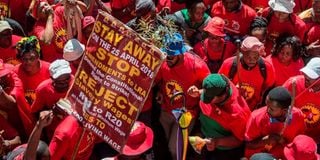Trouble with Africa’s labour movement

Thousands of workers take part in a national strike called by the country's second-largest labour union (South African Federation of Trade Unions SAFTU) against a government-proposed minimum wage on April 25, 2018, in Johannesburg.
The question of why Africa lags behind in creating a sustainable labour environment is complex and multifaceted and there is no single answer that can fully explain the situation. But there are several factors that may contribute to this issue.
One is historical factors. Africa’s history of colonialism, slavery and exploitation has had a significant impact on its development, including the way labour is organised and managed. Many African countries were left with inadequate infrastructure, limited resources and weak institutions after independence, which made it difficult to create sustainable labour environments.
Two, political instability. Many countries experienced political instability and conflict, which weakened labour market institutions and made creating stable and sustainable jobs difficult.
Three, limited access to education and training. This has resulted in a shortage of skilled labour and limited opportunities for career advancement in many African countries.
Struggle with poverty
Four, economic challenges. Many African countries struggle with high levels of poverty, low levels of economic development and limited access to capital, which makes it difficult to invest in sustainable labour practices and infrastructure.
Five, global competition. They face intense competition from other developing countries and emerging economies, making it difficult to attract investment and create sustainable jobs.
Addressing these challenges will require a multi-faceted approach that involves investment in education and training, infrastructure and institutions, as well as addressing political instability and economic challenges.
Politicians must be patriotic and love the citizens of their countries without prejudice of religion, or tribe and, most important of all, promote equality of the countries’ resources.
Mr Rajesh is the CEO of Collection Agency East Africa. [email protected].




